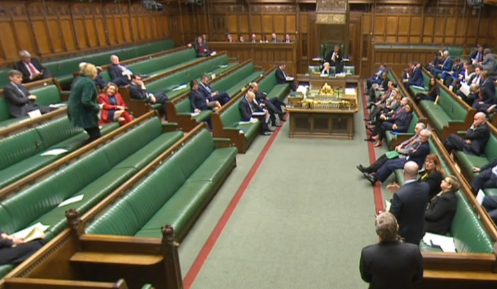Your support helps us to tell the story
From reproductive rights to climate change to Big Tech, The Independent is on the ground when the story is developing. Whether it's investigating the financials of Elon Musk's pro-Trump PAC or producing our latest documentary, 'The A Word', which shines a light on the American women fighting for reproductive rights, we know how important it is to parse out the facts from the messaging.
At such a critical moment in US history, we need reporters on the ground. Your donation allows us to keep sending journalists to speak to both sides of the story.
The Independent is trusted by Americans across the entire political spectrum. And unlike many other quality news outlets, we choose not to lock Americans out of our reporting and analysis with paywalls. We believe quality journalism should be available to everyone, paid for by those who can afford it.
Your support makes all the difference.The Government’s implementation of “English Votes for English Laws” in Parliament does not command the respect of MPs from across the UK and contains elements which are are “complex and largely unnecessary”, a committee of MPs has said.
The Procedure Committee said the system, introduced by the Conservative government, needed to be re-drafted and simplified - warning that the system needed to be changed “if [it] is to be sustainable through the political stresses it must expect to face in the future”.
“The complexity of a system which seeks to join two separate functions—a political voice and a legislative veto—has led to imperfect results,” the report reads.
“It is this contradiction at the heart of the system’s design that the Government must urgently address.”
The cross party group of MPs called for any new system to be made on the basis of a “consensus” of MPs from a different part of the UK.
“One year on from their introduction, we find that the new EVEL procedures do not command the respect and support across all parties that they should if the system is to be sustainable through the political stresses it must expect to face in the future,” the MPs said.
“This is not a sound basis for a major long-term change to the legislative process in this House.
“When reviewing the operation of the present system, and contemplating any change, it is vital that the Government seek consensus from Members representing constituencies in each constituent nation of the United Kingdom for the basis of a system which will meet its policy objectives.”
Charles Walker, chair of the Procedure Committee, said: “I hope that the Government will reflect on our report and use it as an opportunity to greatly simplify the procedures around EVEL.
“The current procedural complexities around English votes for English laws do no credit to the House.”
The current system was introduced by the Government without any legislation, through standing orders in the House of Commons.
The Scottish National Party described the system as "absurd" at its introduction.
Under the current EVEL method, the Speaker designates a part of the bill as relating to just England or England and Wales.
An extra committee stage composed of either a committee of English MPs or a “legislative grand committee” of all English or English and Welsh MPs is applied to the bill.
The idea was supposed to solve the so-called West Lothian question whereby Scottish, Northern Irish and Welsh MPs are able to vote on matters that only affect England.

Join our commenting forum
Join thought-provoking conversations, follow other Independent readers and see their replies
Comments